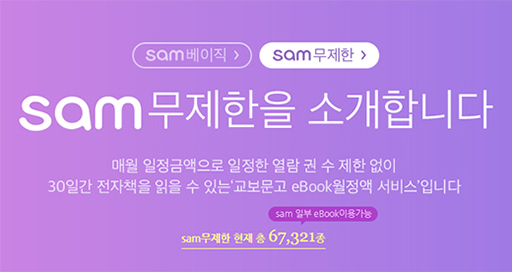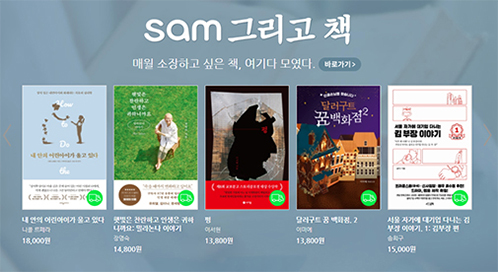Mobile phones provide convenience as they can be used to write or read while on the move. There have been quite a lot of changes in how books, music, movies, dramas, games, and other content are created and consumed. There has also been an increase in the different types of content distribution models that use a variety of smart devices and social network systems. The major examples of this would be short-form content, which you can use for a short period, and subscriptions for sale, through which you can have unlimited access to content depending on the subscription period.
The content industry is quickly transferring from a generation of “owning” to “consuming” worldwide. With the rapid increase of consumers of many contents due to the COVID-19 pandemic, renting content and subscribing to content has successfully settled as popular mass content distribution models. As a result, consumers can freely access various services with a set subscription fee, and service providers can experience the effect of consumer lock-in by receiving a constant income from subscription fees. This is why subscription-type service models are becoming common in nearly every content industry.
According to the “Global Subscription Economy and Our Corporate Business Strategy,” announced by KITA, predictions are that the scale of the market for subscription-based electronic commerce worldwide will increase by nearly 70%, from 13.2 billion dollars in 2018 to 478.2 billion dollars in 2025. The business of subscription-based economies has grown mainly because each individual can have customized services to meet one’s taste based on consumer data, and mostly the MZ Generation (Millennial + Z generation, those born from 1980-2004) are the primary consumers of many types of subscription-based services.
As more and more types of content were consumed, subscription-based service models have settled as public content distribution models.
Subscription-based service models of Korea’s publication industry are being expanded, mainly based on digital content, including e-books and audiobooks. According to the result of years of surveys and various statistics, a monthly fee brings the positive effect of being the cause of consuming content, evaluated as such by users. Like this, the popularity of subscription-based economies should be seen as a sign that asks for an innovative establishment in the relationship with readers. A systematic policy and a business strategy should be established by expanding the range of digital-based content in the publishing industry instead of focusing on paper books.
The subscription-based market for e-books, based on a digital platform, has been growing and has received positive reviews from users. According to the “survey on reading for citizens,” (done every 2 years) conducted by the Ministry of Culture, Sports and Tourism, the percentage of e-books being read increased from 10.2% in 2015 to 16.5% in 2019. Due to the COVID-19 pandemic that started in early 2020, most of the indicators, such as the percentage of e-books being read and the number of users of subscription-based service platforms, have been increasing. It has been analyzed that one of the factors of growth includes individuals using e-book subscription-based services for a longer period as a leisure activity to overcome having to stay indoors. Also, another factor includes the increase in companies that provide subscription-based services as a welfare benefit due to the rise in working from home and a non-face-to-face workload.
The Current State of Korea’s Subscription-based Services for E-Books and Audiobooks
Major subscription-based services for e-books include Kyobo Books’ sam, RIDI Select, Millie, and YES 24 Bookclub. Sam of Kyobo Books started in February of 2013 and has over 4,000 partner publishers with more than 150,000 types of subscription-based services. Volumes of humanities, business, and practical e-books and romance, fantasy, heroism novels take up most of the services titles. RIDI Select that started in July of 2018 provides regular books and premium articles that include columns written by experts of different subjects and content provided by other experts. Millie that started in October of 2017, provides new digital reading experiences by introducing services such as “Chat Book” that summarizes the main content through a dialogue, a tracking function that allows you to turn the page with your eyes, a “My Own Audiobook” service based on Artificial Intelligence technology (AI). In addition, users can use the original paperback service by paying an extra 6,000 won to the monthly payment of 9,900 won for subscribing to e-book services. YES24 Bookclub started in November of 2018 and sells a total of three types of membership (standard/premium/bookclub FLO). Bookclub FLO99 grants users access to unlimited music and works with Storytel, an audiobook streaming service, to provide over 10,000 e-books provided by the YES24 Bookclub for 36,540 won (3 months) and provides unlimited access to more than 50,000 audiobooks owned by Storytel.


Millie original paperback regular subscription banner, Welaaa “Brunch book audiobook publishing project” banner
Subscription services for audiobooks are popular in addition to e-books. Storytel was the first in the world to provide a mobile audiobook service in 2005 and established a branch in Korea in November of 2019. It has been providing an unlimited service based on complete audiobooks for a monthly payment of 11,900 won. Recently, the company has been providing exclusive audiobooks for the original noble series, Disney’s Villains, in which Disney’s villains are the main characters for original content. It is planning to keep investing in publishing audiobooks based on global entertainment content IP that the whole family can enjoy.
Welaaa, a content platform of an influential publisher that started as a company specializing in lectures, is also leading the market for subscription-based audiobooks. Users can read about 20,000 audiobooks of their choice for a monthly payment of 9,900 won after downloading the application. The application exceeded a million downloads in June of 2020 after it started its beta service in April of 2018. Now, it has surpassed 2.2 million downloads. The total of accumulated members equals about 1.8 million, and investment funds are at 46 billion won. It offers a variety of genres, including best-selling novels and economy and business management books. Moreover, you can use the unlimited service for 9,900 won a month. To secure original IP, Welaaa partnered with Brunch, a content publishing platform of Kakao, to go into a “Brunch book audiobook publishing project.”
Subscription-based Services Provided by the Education Industry and Large Companies
Even large education publishers have combined a subscription-based service to the already existing business model to proceed with a new business. Subscription-based educational products are more suitable as subscription-based models since consumers use it from 6 months to a year on average to see learning results. For example, Woonjin Thinkbig launched a monthly audiobook service called “Strawberry Bean” in May of 2021. With a monthly payment of 9900 won, consumers can have unlimited access to audio content for children’s books of about 5,000 types, including the Anthony Brown series, a globally popular picture book series, significant works of Korean children’s literature authors, and Disney English audiobooks. YBM, an English education company, is attracting more members in the subscription-based education market with its “YBM Readers” program. YBM Readers is a program through which subscribers can freely read around 1,000 different types of English e-books recommended by a well-known American publisher, Houghton Mifflin Harcourt. You can start “Fascinating Hangeul Nara A.I. Subscription” of Hansol Education for a reasonable education fee. For a monthly payment ranging from 10,000 to 19,900, you can use teaching aids, picture books, and the Hangeul Nara application based on A.I. technology that analyzes learning density and state by detecting the learner’s expression and BPM.
Large companies have recently been actively investing and going into marketing partnerships with subscription-based platform businesses. In September, the main shareholder of Millie Books changed to Genie music, a media group of KT. Genie music secured 38.6% of Millie Books’ share (46.4 billion won) by taking over Millie Books’ old share and participating in the new paid-in capital increase. As a result, Millie Books’ profit and the number of subscribers have increased by 50% compared to the first half of 2021, with its goal of reaching IPO by 2022. Millie Books is expected to grow more within the media value chain of KT. In August, SK 7mobile, a resale phone brand of SK Telink, partnered with Kyobo Books and launched a “Kyobo eBook” payment plan. This payment plan includes a “sam unlimited” coupon with which you have unlimited access to 67,000 e-books offered by Kyobo Books for up to 24 months. Due to the increase in demand for book-related products that allow people to spend their time at home wisely due to the enhanced measures of social distancing, both companies agreed on a partnership for marketing.


Kyobo Books’ Sam Service Banner, “And Books” Banner
The publishing industry reviews the subscription-based model of published content in multiple ways. There are positive reviews that say that many subscription-based platforms lower the entrance barrier for reading to the public, and act like a big window to secure potential readers. However, some criticize that authors and publishers make relatively less profit. This is because when they do not sell the most copies for subscription-based models, the profit that comes ouis less than when selling a paperback copy.
For the growth of the ecosystem of the publishing industry, subscription-based platforms must provide many types of support and investment for authors and publishers. For example, contest exhibitions for each field to discover new authors and support established ones and promotional support for publications provide a solid basis to content creators to use distribution platforms. As a result, subscription-based service models are greatly influencing the discovery of new readers who have a high level of interest and desire to consume published content. Moreover, the stature of platforms for published content based on smart media will also strengthen.
[Reference]
– The Current State of the Subscription-Based Global Economy and Our Business Strategy, Korea International Trade Association (KITA), 2021.02.15.
– A Subscription-Based Economy for the Education Industry, MBN Money, 2021.07.01.
– Genie Music Takes Over “Millie’s Books,” the Number One E-Book Business, for 46.4 billion won, The Munhwa Il-bo, 2021.09.10.
Written by Ryu Young-Ho (General Manager of KYOBO BOOK Centre Co.,Ltd, Digital Transformation Division)













